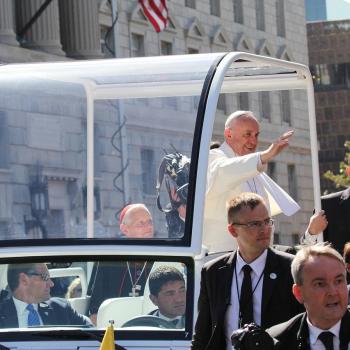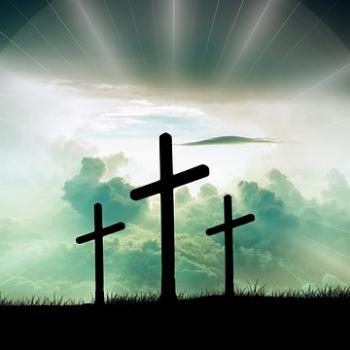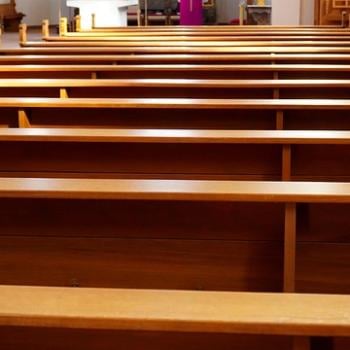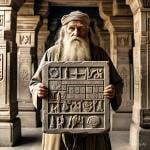ELEANOR’S QUESTION:
Is it sinful for Catholics to attend a wedding between a Catholic and a Jew, performed by a rabbi?
THE RELIGION GUY’S ANSWER:
No.
But there’s much more to be said about how Catholicism views interfaith marriages. (The church is more open on this than those who adhere to Jewish tradition, as we’ll discuss below.)
An official U.S. Catholic Web site says that till recent decades “the idea of a Catholic marrying outside the faith was practically unheard of, if not taboo,” and such ceremonies never occurred publicly in a church sanctuary. Yet today, in some parts of the U.S. up to 40 percent of Catholics are in “ecumenical marriages” between Christians of differing affiliations, or “interfaith marriages” with non-Christians.
The site says “because of the challenges that arise, . . . the church doesn’t encourage” interfaith marriage but does seek to support such couples and “help them to meet those challenges with a spirit of holiness.” Under the law code that covers all Catholics worldwide, says a Canon Law Society of America commentary, there’ve been “extensive changes” in the direction of leniency in marriage rules since the Second Vatican Council (1962-65) and mixed marriages have become “more commonplace and socially acceptable.”
In Catholic belief, a marriage between a Catholic and a Jew (or someone from another non-Christian religion) is not a “sacrament.” Importantly, this doesn’t mean the church questions that the couple is truly married as a civil matter, nor does it express any disrespect toward Judaism, with which Christianity has such great affinity.
The technical term used in marriages with non-Christians is “the impediment of disparity of cult.” If an interfaith couple wishes a wedding in a Catholic church, canon law prescribes that the local bishop must issue a “dispensation” on the basis of “just and reasonable cause,” which occurs far more routinely than in past times.
Under church law, with a church wedding the Catholic party takes a vow to avoid dangers that might lead him or her to leave the Catholic faith. The Catholic also “makes a sincere promise to do all in his or her power to have all the children baptized and brought up in the Catholic Church.”
The Jewish (or other non-Christian) party to the marriage is informed about the spouse’s commitments “at an appropriate time.” Prior to the 1983 canon law reforms, the pledge to raise children as Catholic was also required from the non-Christian spouse and usually formalized in written form, which could cause hard feelings.
The same pledges, by the way, apply when a Catholic marries a Christian from a different denomination, even though there’s no “impediment” to be overcome, though with one technicality. The impediment applies when partners who identify as Christians belong to groups that do not baptize their members (Quakers, Salvation Army) or practice baptism that Catholicism deems invalid for theological reasons, e.g. “Oneness” Pentecostals who deny the Trinity or, as of 2001, Latter-day Saints (“Mormons”).
Helpful discussions of such matters aimed at guiding non-experts are available at http://canonlawmadeeasy.com from Cathy Caridi, an American canon lawyer who practices in Rome. She comments that “while the church isn’t particularly keen on Catholics marrying non-Christians, we can see that it often permits it.”
Her site observes that if it’s not clear the Catholic party will really follow the promises the bishop will decline permission for a church wedding. And a bishop will be hard-pressed to approve “if the non-Catholic spouse is clearly hostile to Catholicism, to the Catholic party’s continued practice of the faith after the marriage, or to the notion that the children of the marriage are to be raised Catholic.”
A Catholic wedding is required to observe “canonical form,” so that the service occurs in a Catholic church except for extraordinary circumstances and is witnessed by a Catholic priest or deacon. A Jewish rabbi or other non-Catholic minister cannot officiate at the actual marriage rite as such but can lead other parts of the service.
As for Eleanor’s exact question, if the bishop sees good reason he can authorize the wedding to occur in the Jewish spouse’s synagogue and led by the rabbi, or even at a non-religious venue before a civil magistrate. This is called a “dispensation from canonical form.” Interestingly, church law forbids holding two separate weddings to get around interfaith complications.
Catholic parish priests or diocesan officials are available and prepared to help explain such matters and deal with complications in particular cases. U.S. Catholicism posts useful general information at www.foryourmarriage.org/interfaith-marriages.
A Catholic-Jewish marriage is a much bigger problem for the Jewish minority. Rabbis in the faith’s Orthodox and Conservative branches are directed not to sanction or participate in interfaith weddings, which are also frowned upon by many in Judaism’s more liberal Reform branch. The prohibition follows unbroken tradition since biblical times (for instance note Deuteronomy 7:3-4).
Orthodoxy’s Rabbinical Council of America declares that a Jew in a mixed marriage is “ineligible for Jewish communal leadership” and strongly condemns rabbis who officiate at mixed weddings. Last year, Conservative Judaism’s United Synagogue authorized membership in congregations for non-Jews alongside their spouses, which traditionalists fear is the first step toward accepting intermarriage.
American Judaism faces intense debate on this in the context of ongoing assimilation and decline. All indications are that most children in interfaith marriages will not be raised Jewish but either become Christians or, more likely, wholly secularized. A 2013 survey of American Jews showed the trend. Among those who’ve married since 2000, 58 percent have a non-Jewish spouse, compared with just over 40 percent for those married in the 1980s and a mere 17 percent with marriages prior to 1970.













